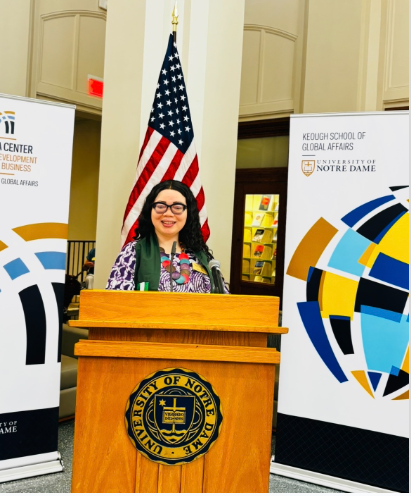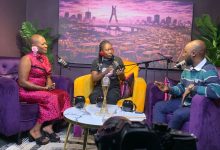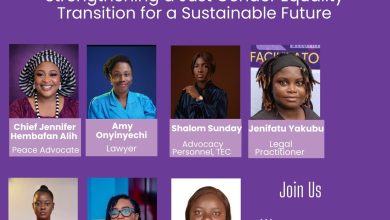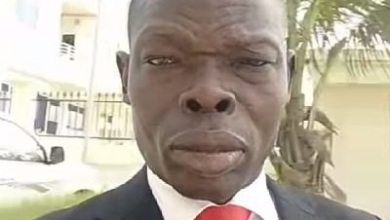Women Making Waves: Elizabeth Adams, On Becoming Mandela Washington Fellow and Strengthening African-Diaspora Ties

Elizabeth Adams Oyarese is an educator, entrepreneur, and inclusion advocate with over a decade of experience in educational management and youth empowerment. As the Founder of Linking Circles Academy, her work has impacted more than 9,000 Nigerian students while championing accessible learning environments.
A 2025 Mandela Washington Fellow, Elizabeth also holds leadership positions with JONAPWD, the Youth Advisory Board, and the Street Project Foundation, representing thousands of young Nigerians. Beyond education, she is a writer, creative arts advocate, and global ambassador for several initiatives, including the UN Global Schools Programme and Future Perspectives.
In this inspiring conversation with Naija Feminists Media, Elizabeth opens up about her journey as a Mandela Washington Fellow, the challenges that have shaped her path, and her vision for inclusive education and youth empowerment in Nigeria.
Elizabeth Adams on Education, Inclusion, and Inspiring the Next Generation Leaders
- As an educator, model, and advocate, what drives you to take on these different roles, and how do they connect with your vision for impact?
My roles as an educator, model, and advocate are interconnected, fueling my vision for impact and inclusion advocacy. Through modelling, I aim to challenge conventional beauty standards and promote inclusivity, thus inspiring others. As an advocate, I’m committed to using my platform to raise awareness about social issues like disability rights, gender equality, and youth empowerment. My work in education and advocacy is deeply connected; by providing access to quality education and promoting inclusive practices, I believe we can create a more equitable society.
My involvement with different youth-led and community-focused organisations has shown me the importance of community-led initiatives in creating lasting change. My ultimate goal is to contribute to a world where every individual has the opportunity to thrive, with accessible education, valued creative expression, and advocacy driven by the needs of marginalised communities. My different roles help me achieve this.
- Tell us about your educational journey. What has been the most challenging part, and how did you overcome it?
During my early education, I faced significant challenges due to my albinism in Nigeria. Teachers bullied and discriminated against me, which fueled my passion to become an educator.
After about a decade in the private educational sector, where I witnessed the neglect of students with diverse learning needs, I founded Linking Circles Academy, an Edtech company that empowers teachers to design safe learning environments.
We offer personalised virtual classes that connect African diaspora students to their culture through academics. In the last two years, we’ve reached five schools, trained 50 teachers, and directly impacted over 1,500 students. We have also worked on projects that empower youth and women.
- Tell us about the Mandela Washington Fellowship. What did you apply for, and how did you get in?
The Mandela Washington Fellowship is the U.S. Government’s programme for young African leaders, offering academic and leadership training in Business, Civic Engagement, or Public Management. I applied for the Business Track, aligning with my work as the founder of Linking Circles Academy Ltd. Out of over 21,000 applicants, I was selected as one of the 54 Nigerian applicants and was placed at the University of Notre Dame for the Leadership in Business institute.
There, I gained hands-on experience in business management, servant leadership, team building, and community service.
- How did you feel when you were selected as a fellow?
Upon receiving the congratulatory call from the US Consulate, I felt excitement and gratitude. Beyond this excitement, I also had episodes of self-reflection that helped me set realistic expectations for my journey.
- What was the experience like? What was it like connecting with other Fellows? How did those interactions shape your vision?
The experience was worthwhile, especially connecting with other African leaders, hearing their perspectives on Nigeria, and identifying similarities in our struggles. These interactions broadened my vision for impact in education and inclusion advocacy, highlighting the potential for collaboration and cross-cultural dialogue to drive greater impact in Africa.
- What was the most impactful lesson or experience you took away from the Mandela Washington Fellowship programme?
The most impactful realisation was that Africa has a rich population of young leaders ready to give back. I saw young, brilliant minds passionate about developing Africa. This helped me see myself as a key contributor to this revolutionary change in Africa and the exceptional ideas shared by young Africans during the fellowship. It made me confident that Africa will see a rising tide of innovative young talents ready to take charge of the continent’s development.
- What skills or perspectives did you gain from the Fellowship that you feel every young African leader should have?
I believe every young African leader should prioritise serving the communities they lead, designing businesses, systems, and processes from an inclusive and human centered perspective.
- How do you plan to use the networks, training, and exposure from the Fellowship to strengthen your advocacy and your academy here in Nigeria?
The Mandela Washington Fellowship Alumni Community offers opportunities for collaboration with other young African leaders. I’m working on projects to improve inclusivity across organisations and leveraging connections with the Notre Dame community to enhance our curriculum and provisions at Linking Circles Academy. My long-term goal is to strengthen ties between Africans and the diaspora, ensuring a continuous and mutually beneficial relationship with Americans.






